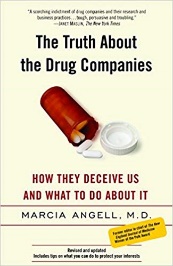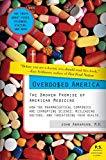“The pharmaceutical revolution of the 50s and 60s has petered out.”[1]
Every week we see articles about some pharmaceutical recall, side effects, overpricing, research hanky-panky and other melodramas. This issue highlights a few of those problems. They do not mean that there is no value at all in drugs, but that it has been overstated, without mentioning the monetary cost and morbidity and mortality from their use. They are excellent in times of crisis. I want them IV if I land in the ICU.
Hugo Rodier, MD


Tylenol May Blunt Empathy
Medscape – Apr 17, 2019
“Investigators showed scenarios of positive experiences to 114 college students who had taken either acetaminophen (1000 mg) or placebo and found that those who had taken acetaminophen experienced less pleasure and empathetic feelings toward the hypothetical characters in comparison with those who had taken placebo. The ability to recognize pleasure and positivity was unaffected.
“We found that acetaminophen reduced the affective, although not the cognitive, side of empathy,” Dominik Mischkowski, PhD, visiting assistant professor, Department of Psychology, Ohio University, Athens, told Medscape Medical News. “But I would like to strongly emphasize that this doesn’t mean you should stop recommending acetaminophen for patients who have pain — pain is a very aversive experience, and a nonprescription painkiller is still a very good tool in the toolbox,” he said. The study was published online March 29 in Frontiers in Psychology.”
Medications for treatment of BPH increase risk for Diabetes
“The New York Times (4/18, Bakalar) reports that “two commonly used drugs for treating an enlarged prostate may increase the risk for Type 2 diabetes.” Included in the study were 39,000 men taking either Proscar (finasteride) or Avodart (dutasteride) and “16,000 men taking tamsulosin (Flomax), a different type of drug for” benign prostate hypertrophy (BPH). The study revealed that “compared with those using Flomax, men using Avodart had a 32 percent increased risk for developing diabetes, and those using Proscar a 26 percent increased risk.” The findings were published in the BMJ.”
Comment: both prostate problems and diabetes are common. Pick your poison or better yet, stop eating processed foods full of pesticides. They are xenoestrogens that fuel prostate and metabolic problems.
Metformin Linked to Worse Cognition, B-Vitamin deficiency
Medscape – Apr 12, 2019.
“Metformin is associated with worse cognitive function in older adults, which could be explained by B-vitamin deficiency, new research suggests. ‘Fortified foods can provide a bioavailable source of B-vitamins and may be beneficial for maintaining better cognitive health in older people with or at risk for diabetes, but this requires confirmation in an intervention trial,’ Dr. Kirsty M. Porter of Ulster University in Coleraine, Northern Ireland, and colleagues conclude in the Journal of Clinical Endocrinology and Metabolism, online March 28. An association between long-term metformin treatment and vitamin B12 malabsorption was first reported more than 40 years ago, Dr. Porter and colleagues note. Deficiencies in B12, along with folate, vitamin B6 and riboflavin, have also been linked to cognitive dysfunction, they add.”
Comment: Metformin affects our liver and gut flora, thus affecting B vitamin absorption and metabolism. B vitamins are critical for neurotransmitter synthesis, liver detoxification, arterial health and DNA unfolding. Other than that it is quackery.
Low Cholesterol: Higher Risk of Hemorrhagic Stroke
Medscape – Apr 15, 2019.
“Women with very low levels of low-density lipoprotein cholesterol (LDL-C) and triglycerides may be more than twice as likely to have a hemorrhagic stroke than women with higher levels, a new study suggests. Investigators at Harvard University prospectively studied a cohort of almost 28,000 women who had been enrolled in the Women’s Health Study over a period of approximately 20 years. They found that compared to those whose LDL-C levels were 100 – 130 mg/dL, women whose LDL-C levels were <70 mg/dL had more than twice the risk of experiencing hemorrhagic stroke, after adjusting for other factors that could affect stroke risk. Similarly, women whose triglyceride level was in the lowest quartile had a significantly increased risk for hemorrhagic stroke, compared to women whose level was in the top quartile, after multivariable adjustment. ‘I think the main take-home message for physicians is that women with low levels of LDL cholesterol are usually considered at low risk for heart attack and stroke, but they might still have increased risk of hemorrhagic stroke,’ lead author Pamela Rist, ScD, assistant professor, Harvard Medical School, Boston, Massachusetts, told Medscape Medical News. ‘Given the morbidity and mortality associated with hemorrhagic stroke, it is important to monitor these women for other risk factors, such as hypertension and smoking, to lower the risk of hemorrhagic stroke,’ she said. The study was published online April 10 in Neurology.”
Comment: interestingly, the study does not mention the use of statin drugs to aggressively lower cholesterol, at least not the version I was able to find. Why do you think it does not?
Link between dementia and anticholinergic medications
“USA Today (6/24, Aspegren) reports that research has “found that there is a link between dementia and certain classes of anticholinergic drugs.” Investigators found that “the drugs, particularly antidepressants, bladder antimuscarinics (oxybutynin), some anti Parkinson drugs, atropine for asthma, antipsychotics and antiepileptic drugs, resulted in nearly ‘50% increased odds of dementia.’” The findings were published online in JAMA Internal Medicine.”
Comment: some of the drugs above may be life saving in times of crisis. Still, it would be better to look for the cause of diseases. For example, Parkinson has been associated with pesticides.
Gabapentinoids and risk for suicidal behavior, other side effects
“Reuters (6/17, Harding) reports that gabapentinoids (gabapentin, pregabalin, and mirogabalin) appear to increase “users’ risks for suicidal behavior, unintentional overdoses, injuries and car accidents – and the risks are particularly high for teens and young adults,” researchers concluded after examining “Swedish registry data on 191,973 people age 15 and older prescribed pregabalin or gabapentin in 2006-2013.” The findings were published online June 12 in the BMJ.”
Comment: these drugs offer limited benefits and they are often prescribed for conditions that have not been studied. Are they worth the risk when suicides are reaching epidemic proportions?
Moving on from all the gloom and doom above…
Cannabidiol appears to have potential as an antibiotic
“Newsweek (6/23, Gander) reports researchers found that cannabidiol “killed all the strains of bacteria they tested in a lab, including some which are highly resistant to existing antibiotics,” meaning the chemical found in cannabis could have potential as an antibiotic. The findings were presented at ASM Microbe 2019.”
Comment: just as we have the freedom to try pharmaceutical drugs, I believe we should have the freedom to try any drug we choose. That is the two-edge sword of adulthood. If you believe we should be protected from ourselves as children, take a look at Portugal: liberalizing and decriminalizing drugs has led to a significant drop in abuse, morbidity and mortality.
 Supernatural, Graham Hancock for some light summer reading.
Supernatural, Graham Hancock for some light summer reading.
- Journal Science 2002;296:698 ↑


